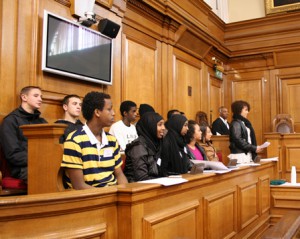Using Facebook and Twitter in the Courtroom
The Wall Street Journal Law Blog recently had a post on social networking sites being used to determine a person’s suitability to sit on a jury. For decades we have used a traditional strategy to select a jury called voir dire. In voir dire, prospective jurors are questioned about their background and any potential biases from both attorneys in a case. Rounds of elimination ensue until a jury of twelve is reached. Since this method has worked so well, would adding technology be so horrible?
Whether you love it or hate it, social networking sites such as Facebook and Twitter have seeped into our daily lives. People check their profiles multiple times during the day. Statuses are updated on an hourly basis via one’s computer or phone. People often look up people who they have just met, or may meet in the near future, to get a sense of the individual.
 Therefore, why should it be left out of the courtroom? After all, is it not in the best interest of our justice system to have the most capable, unbiased, and prudent people on a jury? Facebook and Twitter allow for lawyers to get an idea of prospective jurors, which can better help them choose suitable individuals.
Therefore, why should it be left out of the courtroom? After all, is it not in the best interest of our justice system to have the most capable, unbiased, and prudent people on a jury? Facebook and Twitter allow for lawyers to get an idea of prospective jurors, which can better help them choose suitable individuals.
Many people are objecting to the use of Facebook and Twitter by lawyers during jury selection because they claim it is an invasion of their privacy. However, if privacy is defined as being able to seclude oneself from public view, merely joining Facebook and Twitter allows others to invade our privacy. By joining these sites, a person allows their information to be online, available to others.
Now of course, there are privacy settings, but people have found ways around them; hence the constant updates to the privacy policies of these sites. Therefore, a person cannot accuse another of invading their privacy when they themselves have made their information public.
Rather than a random person reading your profile, a lawyer may do so to get a sense about you. However, the lawyer is not invading your privacy because you voluntarily put the information out there. Since Facebook and Twitter have made us all accessible to anyone and everyone all over the world, it is unreasonable for us to believe that we can control how our information is being used. Rather than complain about these uses, we need to remind ourselves that social networking sites carry with them the price of sacrificing some of our privacy.

Comments
I do agree that this is not a violation of privacy since the user in fact put the information on the web knowing that many poeple could see it. However, I do not understand what information a lawyer will take away based off of pictures and wall posts?
During jury selection, lawyers try to get a sense of people in order to determine whether or not they want them on the jury. Through questioning, they try to determine if having a certain person on a jury will either help or hurt their case. Looking people up on social media sites is a way of getting to know what type of person a juror is.
I agree with you though, because a person’s Facebook and Twitter account may not give a true sense of the person. It is just another means that lawyers are now trying out.
I have been providing live courtroom updates via Twitter http://twitter.com/Msjournalist
(@Msjournalist) at the Federal corruption trial of former Gov. Rod Blagojevich (I did this at first trial as well) I am told followers feel like they are in the courtroom.
These sites are slowly but surely leaking into all aspects of life. I am not saying it’s a bad thing, jus’ sayin’…